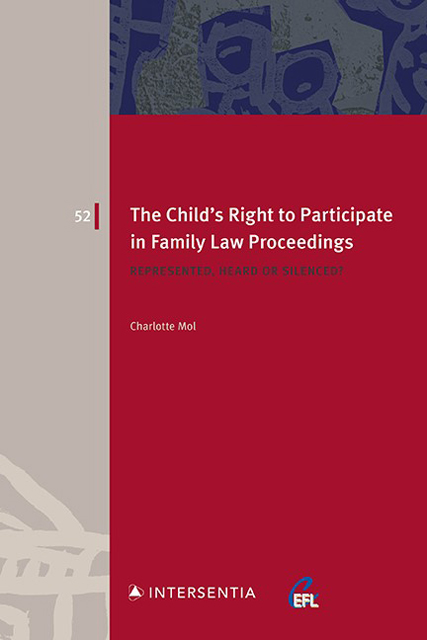Book contents
- Frontmatter
- Acknowledgements
- Contents
- List of Tables and Figures
- List of Abbreviations
- List of International and European Instruments and Sources
- List of Cases
- Chapter 1 Introduction
- Part I The Child’s Right to Participate in International and European Human Rights Instruments
- Part II The Child’s Right to Participate in The Case Law of the ECtHR
- Part III Comparative Remarks and Conclusions
- Appendix: Categorization of Cases Per Type of Proceeding
- Bibliography
- Index
- About the Author
- European Family Law Series
Chapter 5 - (In)Sufficient Participation
Published online by Cambridge University Press: 20 April 2023
- Frontmatter
- Acknowledgements
- Contents
- List of Tables and Figures
- List of Abbreviations
- List of International and European Instruments and Sources
- List of Cases
- Chapter 1 Introduction
- Part I The Child’s Right to Participate in International and European Human Rights Instruments
- Part II The Child’s Right to Participate in The Case Law of the ECtHR
- Part III Comparative Remarks and Conclusions
- Appendix: Categorization of Cases Per Type of Proceeding
- Bibliography
- Index
- About the Author
- European Family Law Series
Summary
‘The Court is particularly struck by the fact that after four years and three months the [child] has not yet been heard in those proceedings and thus given a chance to express her views …’
– ECtHR, M. and M. v. Croatia (2015)Introduction
In the landmark judgment of M. and M. v. Croatia (2015) quoted above, the European Court of Human Rights (ECtHR) strongly condoned the complete lack of participation by the child in prolonged proceedings on custody. Unsurprisingly, whether the child can (or could) participate in proceedings is a primary question regarding child participation. However, the distinction between sufficient and insufficient participation is not always so clear-cut; it concerns not only whether participation occurred or not, but also the manner in which participation occurred. For example, should a child be able to speak to the judge directly or is a report by an expert sufficient? What about representation – does it matter who the representative is and how they represent the child? In essence, it examines how, when and which children should be able to participate in family law proceedings. This chapter addresses all the complaints, remarks and reasoning on (in)sufficient participation as the first theme in the case law analysis.
The complaints of applicants, arguments of governments and reasoning of the ECtHR on whether the child’s participation in the domestic family law proceedings was sufficient or insufficient will be discussed. As was discussed in Chapter 4, this structure allows for a complete understanding of the ECtHR’s reasoning on child participation in family law proceedings. Out of the 88 cases analysed in this research, a total of 46 addressed the (in)sufficient participation of the child. These 46 cases are discussed in this chapter. Following the separate analysis of the applicants’ complaints (see section 2), governments’ arguments (see section 3) and the ECtHR’s remarks and reasoning (see section 4), a concluding analysis is presented (see section 5). This chapter closes with a number of standards derived from the case law analysis for states (see section 6).
- Type
- Chapter
- Information
- The Child's Right to Participate in Family Law ProceedingsRepresented, Heard or Silenced?, pp. 151 - 200Publisher: IntersentiaPrint publication year: 2022

